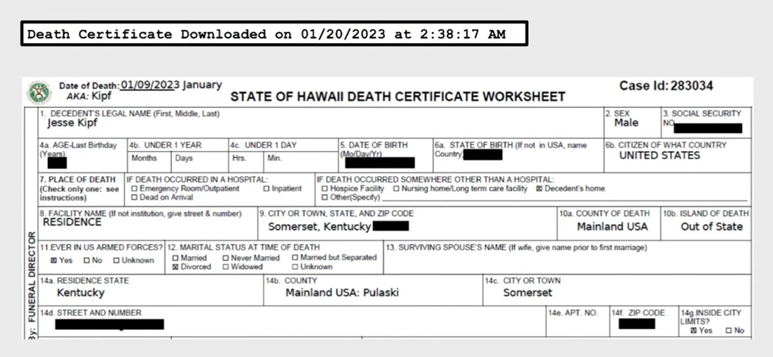Man
Professional
- Messages
- 3,225
- Reaction score
- 1,016
- Points
- 113
Small mistakes sent Jesse Kipf to jail and exposed connections with large hacker groups.
In January 2023, an unknown attacker gained access to a doctor's account in the Hawaii death registration system and issued a death certificate for Jesse Kipf, indicating that he died of COVID-19.
The event soon surfaced on one of the hacker forums, where a hacker with the nickname "FreeRadical" tried to sell access to a system that allows you to create and confirm fake death documents. The hacker attached a screenshot of the certificate to the ad, but made a mistake - he left part of the state coat of arms and information about the place of birth, which helped to establish his identity.
The publication was noticed by Mandiant specialists. Analyst Austin Larsen, while monitoring activity on forums, recognized that the hack was related to the Hawaii registration system. Just 3 days later, Larsen reported the break-in to state authorities. The investigation revealed that the doctor's account used to issue the false certificate had been hacked by Kipf himself, the man who allegedly died.

Jesse Kipf's Fake Death Certificate
As it turned out later, Kipf faked his death to avoid paying alimony to his ex-wife in the amount of more than $ 116,000. Prosecutors called Kipf a "serial hacker" who conducted illegal activities from his home in Kentucky. Kipf made a number of mistakes, including using his home internet to access the system, which allowed for a quick location. In November 2023, the US Department of Justice charged Kipf with hacking into the computer systems of three states and partner companies of large hotel chains.
During the investigation, it was revealed that Kipf operated under various aliases in hacker communities, including "GhostMarket09", and sold stolen credentials. Experts linked him to the Scattered Spider group, which was allegedly behind the attack on MGM Resorts. However, Kipf, according to the investigation, was not part of the group, but simply sold it data.
In May 2023, Kentucky law enforcement received a notification that someone from their state had hacked into the Hawaii system. In July, agents detained Kipf at his home. During interrogation, the hacker confessed to cybercrimes, stating that the hacks allowed him to not work for 5 years.
Kipf also admitted that he hacked into the death registration systems of other states, and once issued a death certificate under the fictitious name "Rangoon the Crab" - the name of a Chinese dish. Kipf also sold access to company networks, including Marriott systems.
The evidence and confessions collected allowed Kipf to strike a deal with prosecutors. In August, the court sentenced him to 6 years and 9 months in prison, accusing him of causing $80,000 in damage to government and corporate systems, as well as failing to pay alimony for $116,000. According to US law, Kipf will have to serve at least 85% of the appointed term, that is, more than 5 years.
Source
In January 2023, an unknown attacker gained access to a doctor's account in the Hawaii death registration system and issued a death certificate for Jesse Kipf, indicating that he died of COVID-19.
The event soon surfaced on one of the hacker forums, where a hacker with the nickname "FreeRadical" tried to sell access to a system that allows you to create and confirm fake death documents. The hacker attached a screenshot of the certificate to the ad, but made a mistake - he left part of the state coat of arms and information about the place of birth, which helped to establish his identity.
The publication was noticed by Mandiant specialists. Analyst Austin Larsen, while monitoring activity on forums, recognized that the hack was related to the Hawaii registration system. Just 3 days later, Larsen reported the break-in to state authorities. The investigation revealed that the doctor's account used to issue the false certificate had been hacked by Kipf himself, the man who allegedly died.

Jesse Kipf's Fake Death Certificate
As it turned out later, Kipf faked his death to avoid paying alimony to his ex-wife in the amount of more than $ 116,000. Prosecutors called Kipf a "serial hacker" who conducted illegal activities from his home in Kentucky. Kipf made a number of mistakes, including using his home internet to access the system, which allowed for a quick location. In November 2023, the US Department of Justice charged Kipf with hacking into the computer systems of three states and partner companies of large hotel chains.
During the investigation, it was revealed that Kipf operated under various aliases in hacker communities, including "GhostMarket09", and sold stolen credentials. Experts linked him to the Scattered Spider group, which was allegedly behind the attack on MGM Resorts. However, Kipf, according to the investigation, was not part of the group, but simply sold it data.
In May 2023, Kentucky law enforcement received a notification that someone from their state had hacked into the Hawaii system. In July, agents detained Kipf at his home. During interrogation, the hacker confessed to cybercrimes, stating that the hacks allowed him to not work for 5 years.
Kipf also admitted that he hacked into the death registration systems of other states, and once issued a death certificate under the fictitious name "Rangoon the Crab" - the name of a Chinese dish. Kipf also sold access to company networks, including Marriott systems.
The evidence and confessions collected allowed Kipf to strike a deal with prosecutors. In August, the court sentenced him to 6 years and 9 months in prison, accusing him of causing $80,000 in damage to government and corporate systems, as well as failing to pay alimony for $116,000. According to US law, Kipf will have to serve at least 85% of the appointed term, that is, more than 5 years.
Source
